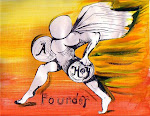Translation by Robin Waterfield, in Oxford paperback.
Chinese proverb: I hear, and I forget; I see, and I remember; I do, and I understand.
It ought to be borne in mind that the etymological root of the word "republic," res publica, is Latin, not Greek (I don't know what the original title, if it had one, translates as), and translates as "matters concerning the people." The concept of a republic, as we know it, today, was not born, when Plato wrote this. Anyway, I like Plato: he was a bright guy. People wank on about Republic being important, because it's a microscopic discussion, in the Socratic style (Plato was a pupil of Socrates), of the question of morality, and how one achieves this through a balance of wisdom, courage and restraint. Well, it may be, but the clarity of the guy's thought is what strikes me, irrespective of what he is discussing, here.
First, Plato's argument, in Republic, is presented in the form of an imaginary dialogue, which is some feat in itself (you try it, and see). He imagines Socrates having this discussion. In modern psychotherapy, this is known as perspective positioning. To even think to do that impresses me. And second, Plato is an exponent of the dialectic method of argumentation. Dialectic is also used in psychotherapy, although, while it's an extraordinarily straight forward principle, it's very difficult to retain one's discipline, and not introduce one's own beliefs into the argument, such that one ends up defending one's position as though it were the truth, at the expense of the objective, which was to establish the Truth - one has to be prepared to abandon one's own beliefs, if they are demonstrated to be insupportable.
Quite extraordinary: a brilliant mind, without doubt, and perhaps it's not surprising that Plato's academy numbered such great minds as Aristotle. Socrates, Plato, Aristotle - they probably had more extraordinary ideas in a single day than most do in a lifetime; and they probably abandoned them, as not perfect enough.
"However, we must look into the postponed issue of whether moral people have a better or more fulfilled life than immoral people. I must say that at the moment it does look to me as though they do, on the basis of what we've been saying [note: he avoids being dogmatic and doesn't state this is as fact, merely a tendency]. All the same, we must look more closely at the matter, since what is at stake is far from insignificant: it is how one should live one's life."
"Go ahead with your investigation, then," he said.
"All right," I said. "Tell me please: "do you think that a horse has a function?"
"Yes."
"And would you say that a horse's function, or anything else's function, is what can be done only with that thing, or can be done best only with that thing?" [Note: this discussion, although not necessarily this question, appears to assume that a horse exists to serve man, which is not a given, but we should allow Plato a little latitude!]
"I don't understand." [Note: again, this simple acknowledgement is used in psychotherapy, in order to secure clarification, and understanding - it's called Clean Language, and the response to such clarifying questions (because this is a question, even though it's not phrased as such), is usually massively beneficial to both client and practitioner. If one doesn't understand, one asks, because it's easy enough to misunderstand, at the best of times, but if one pretends to understand, in order to avoid looking foolish, then one is almost sure to completely lose the thread, and then everything that is said, from that point on, simply serves to further confuse. What usually happens, and happens in this case, is that the client starts to use metaphor, in order to explain their position.]
"Look at it this way: can you see with anything except eyes?"
"Of course not."
"And can you hear with anything except ears?"
"No."
"Would it be right, then, for us to say that these are their functions?"
"Yes."
"Now, you could cut a vine-twig with a shortsword or a cobbler's knife or plenty of other things, couldn't you?"
"Of course."
"But I should think that the best tool for the job would be a pruning-knife, the kind made especially for this purpose."
"True."
"Shall we say that this is its function, then?" [Note: seeking agreement, checking that both parties still understand one another, as they proceed. It's fucking genius.]
"Yes."
Anyway, you can buy a copy for yourself, if you want to find out where he was going with that line of argument, but perhaps it's not surprising that Socrates was executed on the trumped up charge of "corrupting the young," or whatever it was - it must have been absolutely terrifying for the political "elite" to consider the possibility that people would start to deconstruct human society, having been taught to think for themselves, which, in the Christian tradition, at least, is what we're supposed to be able to do. Who's playing God, these days, I wonder?
Thursday, 3 July 2008
Subscribe to:
Post Comments (Atom)

.jpg)






3 comments:
This is a great choice Matt; and one that is going to take me much time to leave an intelligent comment!
I'd be surprised if that were true, although, being a complex book, you may have to read a significant portion of it - at least the first and last chapters, in order to understand what he's talking about.
Matt
Anonymous: Please refer to my April posting, "Dealing with online bigotry," for my official response to your irrelevant twitterings.
Matt
Post a Comment